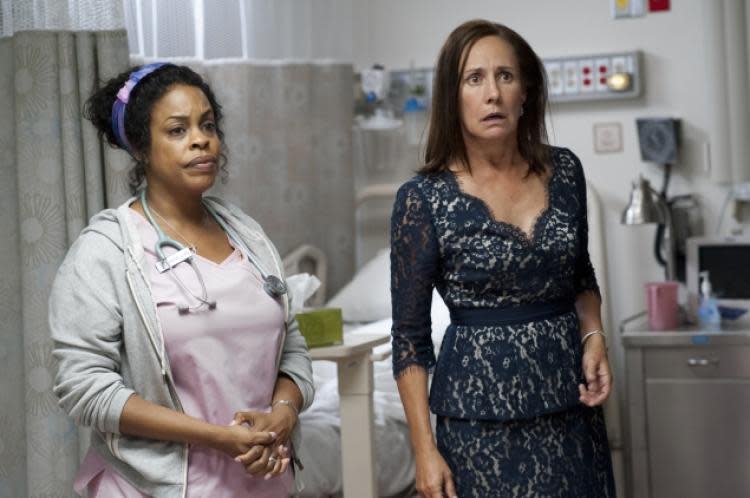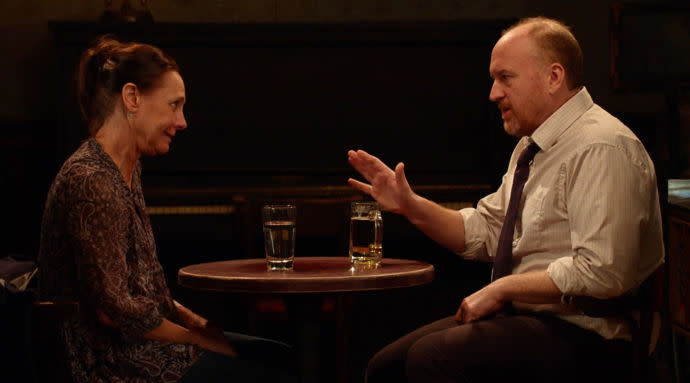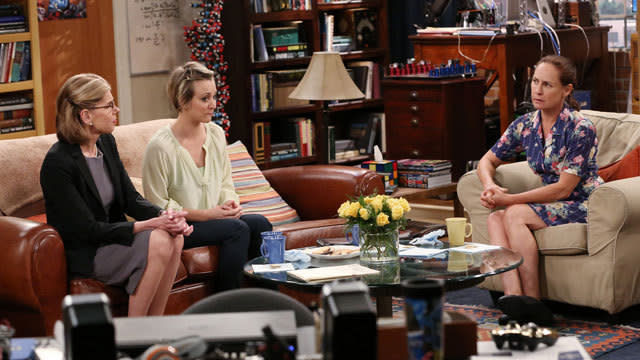Emmy Talk: Laurie Metcalf on ‘Getting On’ Awkwardness, That Amazing ‘Horace and Pete’ Monologue, and Being Sheldon Cooper’s Mama

Photo: HBO
There’s only one downside for Laurie Metcalf of winning all three Emmys she’s nominated for this year: Having to prepare three acceptance speeches. Three nominations for three different shows means a lot of different people to thank, and a lot of names to remember. “I can’t imagine. I’ll have to have something [prepared], just in case. Otherwise you’re a fool,” Metcalf tells Yahoo TV. “I have not thought about it yet, to tell you the truth. I can’t speak off the cuff at all.”
The actress, already a three-time Emmy winner for her role as Jackie Harris on the classic sitcom Roseanne, is nominated this season for Outstanding Lead Actress in a Comedy Series for the HBO comedy Getting On, and, in a pair of Outstanding Guest Actress categories: one for Drama, as the ex-wife of Louis C.K.’s Horace in the web series Horace and Pete, and one for Comedy, for her recurring role as Sheldon Cooper’s no-nonsense mama Mary on The Big Bang Theory. Metcalf talked to Yahoo TV about her most recent standout performances, including the one that left her so drained she treated herself to wine and a whole pizza afterwards.
Getting On was such a different show, so raw and honest, and uncomfortably funny. What did you love most about playing Dr. Jenna James?
I loved the free pass of being as aggressive as I wanted to be, as inconsiderate as I wanted to be, as charmless as I wanted to be, with the most hideous bedside manner possible that I wanted to do. I really enjoyed playing somebody who was that driven and that unaware of the ramifications of anything that she does or says. I didn’t have to worry about it either, because the writers, Mark Olsen and Will Scheffer, were so smart in giving her just every so often just a little drop of humanity, where you could regroup, maybe reassess your feelings about her, and see that she’s not all bad. There is a heart in there. She just doesn’t have tolerance for people who aren’t like her. She would probably say that she’s one of the most caring people that there is.
Some actors say they don’t have to like the characters they’re playing. Others say they do have to find something, even if it’s in a character that’s evil. Where do you fall on this topic?
I don’t know if I would say I have to like the character, but I have to understand where the character is coming from. Even if I have to create some reason, if I can’t find it in the lines or something, I have to figure out how I can identify with whatever traits that character has. Like in Jenna, I guess, the fun part is people around her misinterpreting her motives some of the time, when she’s brusk or critical of other people. All I would have to do is flip it in my head and say, “Well, everything she’s doing is to be helpful.” Then I guess that’s me liking her more, but certainly understanding her more, where she’s coming from.
The show only lasted 3 seasons. Would you do more if the possibility arose?
Well, we were hoping for more. The final season was very, very bittersweet, because we knew it was the last.
Related: Read More Emmy Talks
We all still secretly hope it could somehow come back. I’m grateful that we got 18 episodes out of it, but I would drop everything to do more of them. I just thought the quality of it was everyone operating at their highest level, all the cast, all the writers, direction, everything. Yes, it wasn’t for everyone. The setting itself is hard for a lot of people to watch, but the people who would approach me about it absolutely loved it because it was so unique. The writers had to walk such a fine line to be able to pull humor out of that environment the show was set in, and heart out of it. To pull those two feelings out of a show set in a rundown geriatric hospital ward was a challenge. They managed to do it. When you get a show like that, that you’re so invested in and is so special to you … those are few and far between. For that reason, I’d love to revisit it, if it was ever possible.

Photo: Horace and Pete
Horace and Pete was another very different, wonderful series. Your episode in particular, Episode 3, that amazing monologue… did it feel like a play to you?
Well, yes. When I first saw the episodes, I thought of them as plays, one acts that [Louis C.K.] had written. That’s how they were being performed, as far as I could tell. It looked seamless. The luxury of doing it just across the table from each other was fantastic, but it still did strike me as a one act. Then you still could do it in a small space, and I think it would be riveting.
When you first read it, did you think it was daunting? And you shot it all in one day, right? Was that one of your most exhausting professional days ever?
It actually was. It was mentally really exhausting. It was a challenge in the best sense possible, and I knew it would be. It was difficult to learn, although that’s the cliché. Like, “Oh, how do you learn all those lines?” It was hard because I suspected that he would want to do it in one shot. I knew I had to know it forwards and backwards. It took me a month to learn it, just drilling it, drilling it. Then we shot it. I was doing a play in New York [Misery, with Bruce Willis], so we shot it on my day off. It was really super intense, about three hours.
[Louis] gave me really great notes. We would just do it multiple times, although God, it took like 35 minutes to do it each time, something like that. I don’t know how long it is. He was a wonderful acting partner, really present and having the luxury of just focusing on each other was something. I walked home from where he shot it to the apartment that I was staying in in New York, got myself a full pizza, a whole pizza, and drank red wine and gorged on it the rest of the night. That was my treat, because it was very daunting.
Your character, Sarah, is so vulnerable… she’s telling her ex-husband — who cheated on her with her sister — about her her affair with her current husband’s 84-year-old father. How did you prepare for that aspect of it? It’s one thing to learn that dialogue, but then to perform it so beautifully as a monologue for much of it, in that fraught relationship, took it to a whole different level.
I mistakenly thought that the way into the scene was to be more chatty, because on the page, that’s what it looks like until it goes deeper and deeper and deeper. Then you see halfway through the monologue that, “Oh, wait a minute. She’s with this guy, this father-in-law?” I thought that would be the reveal, or the mislead would be, “Oh, it seems like it’s just a normal conversation,” and then it turns. [Louie] asked me to try it differently, which was to basically to start it off as a confession. It’s already there. There’s no nonchalance about it at all, which was a great note and clicked with me. I made that adjustment.
I love what you do with your voice in the performance, too. Your voice sounds different than I’ve ever heard it sound… deeper? The volume, the pace, everything. It pulls the viewer into what Sarah is saying and makes you want to lean in and listen more.
I didn’t do anything on purpose with my voice, but I think what it was is that I had the luxury of being super intimate. It’s even more intimate than Getting On. I think maybe it went deeper because it was just so intimate, but what I did try to stay conscious of was the pace, because I just … you need to technically remind yourself to mix it up and just not get into one rhythm.

On to your third nomination: The Big Bang Theory. Did you expect when you debuted as Mary in the first season that you would still be playing the role almost 10 years later?
Well, I had no idea how often they would want to see Sheldon’s mom, but I love popping in once a year, whatever it is, once a season or so. I think she’s really, really judgmental, but it’s couched behind a smile, and that she thinks she is always right because she has God on her side. I think that gives her a weird confidence that she can’t be wrong about anything, but other people can be wrong. What’s great is that her son is rooted in science and she’s in religion … it was just so smart to have them come always from those two different worlds, two different places.
Mary was part of a very big cliffhanger at the end of Season 9, in a way that means maybe potentially we would see her more often. Can you say anything about going forward in the Season 10 premiere?
Well, we’re going to tape that episode on Tuesday. I just read it.
Can you share what your reaction was?
I still couldn’t even answer your question, having read it. I’m still not quite sure what’s happening. I know that Sheldon and Leonard are afraid that they’re going to become brothers, stepbrothers. They’re both terrified of that.
And I have to ask you about Roseanne. The show was such an influence on TV comedy. Were you aware at the time of how impactful the show was then?
Not right off the bat, I wasn’t. No. I was very new, too. I had never done TV, ever. The whole experience was new to me, but I guess I began in a really na?ve way to see how the show had exploded when I would go places and people would say, “Oh, you play Jackie on Roseanne.” All of that was a new experience to me. I had been just hunkered down in Chicago, doing theater in one spot. I began to see, “Oh, wait, there’s not just 100 people watching this. There’s millions of people watching this.” [The show] went to number one; that took some getting used to. I’ve been really fortunate in that sense, whether it’s the Roseanne show or being a member of Steppenwolf Theater or in voiceover, being involved with Pixar, and the recent shows. I’ve been working with the best people that there are.
The Big Bang Theory Season 10 premieres Sept. 21 at 8 p.m. on CBS
Getting On is available to stream at HBO Now, HBO Go, and Amazon Video
Horace and Pete is available to stream at LouisCK.net
The Creative Arts Emmy Awards will air Sunday, Sept. 17 at 8 p.m. on FXX. The 68th Annual Primetime Emmy Awards will air Sunday, Sept. 18, on ABC.

